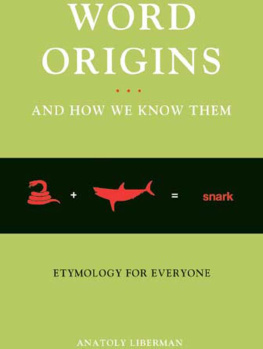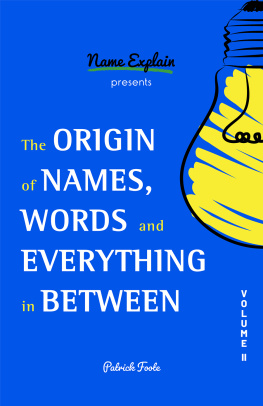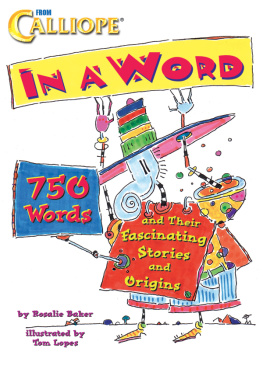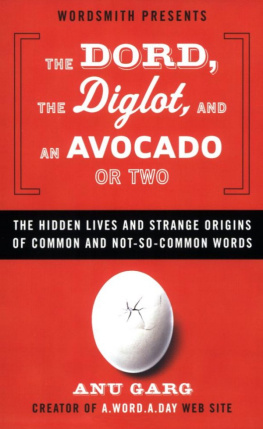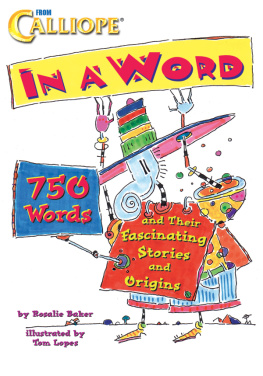WORD ORIGINS

This is not a squirrel (see p. 44).
Detail from Allegorical Millefleurs Tapestry with Animals,
c. 153045, Bruges, Belgium. The Minneapolis Institute of Arts,
Gift of Mrs. C. J. Martin in Memory of Charles Jairus Martin.
WORD ORIGINS
and How We Know Them
Etymology for Everyone
ANATOLY LIBERMAN


Oxford University Press, Inc., publishes works that further
Oxford Universitys objective of excellence
in research, scholarship, and education.
Oxford New York
Auckland Cape Town Dar es Salaam Hong Kong Karachi
Kuala Lumpur Madrid Melbourne Mexico City Nairobi
New Delhi Shanghai Taipei Toronto
With offices in
Argentina Austria Brazil Chile Czech Republic France Greece
Guatemala Hungary Italy Japan Poland Portugal Singapore
South Korea Switzerland Thailand Turkey Ukraine Vietnam
Copyright 2005 by Oxford University Press, Inc.
Published by Oxford University Press, Inc.
198 Madison Avenue, New York, NY 10016
www.oup.com
First issued as an Oxford University Press paperback, 2009
ISBN-13: 978-0-19-538707-0 (pbk)
Oxford is a registered trademark of Oxford University Press
All rights reserved. No part of this publication may be reproduced,
stored in a retrieval system, or transmitted, in any form or by any means,
electronic, mechanical, photocopying, recording, or otherwise,
without the prior permission of Oxford University Press.
The Library of Congress has catalogued the hardcover edition as follows:
Liberman, Anatoly.
Word origins : and how we know them :
etymology for everyone/Anatoly Liberman.
p. cm.
Includes bibliographical references.
ISBN-13: 978-0-19-516147-2
1. English languageEtymology.
I. Title.
PE1574.L43 2005
422dc22 2004023057
1 3 5 7 9 8 6 4 2
Printed in the United States of America
on acid-free paper
Contents
in which the author introduces himself, assumes a confidential tone, and suggests that etymology and entomology are different sciences, or
in which another important distinction, this time between words and things, is made, or
which descends from philosophical heights to cooing doves and mooing cows and explains in passing that sauce for the goose is sauce for the gander and that boys will be boys, or
which makes sense because it is sound. Mooing cows and cooing doves give way to sleazy politicians, but they unite later to produce a coherent theory of word formation, or
in which people take the cause of word origins in hand, or
in which words dilly-dally, shilly-shally, and play tick-tack-toe in disregard of the hubbub they produce, or
which extols swelling from within, or
which makes it clear that although swelling is good, shrinking is also good, or
which proves beyond reasonable doubt that disguise and treason are everywhere, or
which suggests that in the world of words anonymity is the greatest reward, or
in which history pretends to raise its veil, or
whose main theme is the mixed blessing of globalization, or
in which the plot does not thicken, or
in which etymology becomes a science, rejoices, and then has second thoughts, or
in which nothing means what it says, or
in which the author meanders a little (as is his wont) but then comes to the root of the matter, or
in which the author surveys the scene and treads the downward slope, or
in which the author, having reaped the wordwind, comes full circle, and takes farewell of his readers in the hope of meeting them again, or
Chapter One
in which the author introduces himself, assumes a confidential tone, and suggests that etymology and entomology are different sciences, or
The Object of Etymology
Jacob Grimms hours of leisure.Heifers as moving forces in the progress of etymology.Pride before the fall.The simpleminded Nathan Bailey.Who else if not I?Past fame counts for nothing.The search begins.Words and bugs.
One evening, nearly twenty years ago, I was reading a description of a German dialect. Jacob Grimm, of fairy tale fame, the elder of the two brothers and the founder of just about everything in the science of historical linguistics, used to copy Anglo-Saxon manuscripts before going to bed, but doing so would nowadays be a waste of time, because all Anglo-Saxon, or Old English, texts exist in multiple editions. German dialects have also been discussed in such detail since the Grimms days that hardly a village remains whose vernacular is not known from a dissertation by a native speaker. It was, therefore, not my goal to copy anything. Like ancient manuscripts, though, tales of rural life told in the peculiar idiom of a remote hamlet have a soothing, even soporific, effect and are good to read after midnight.
In an anecdote recorded in Hesse (the Germans call this province Hessen) and included in the book I had in front of me, the word Hette (goat) occurred. Although familiar to me from my earlier studies, it suddenly set me thinking, for at that time I was trying to discover what the Old Scandinavian name Heirn means ( = th, as in Engl. this; means long u as in Engl. who). According to a myth preserved in a medieval Icelandic lay, Heirn is a goat from whose udder a never-ceasing stream of mead flows. Each part of Heirn is transparent (hei- [brightness of the sky] or [heath], or [honor], and rn [rune]), but the whole makes little sense when applied to a goat. Yet a heavenly goat is a character in many myths, along with she-bears, horses, and harts, so that Heirns name could not be bestowed upon it by chance or by mistake. Is it possible, I asked myself, that Hette is in some obscure way related to Heirn? If this conjecture had turned out to be correct (it did not), Heirn would have emerged as meaning goat, a most appropriate name for a goat.
While searching for the origin of Heirn and Hette, of which only the first interested me seriously, I remembered the English noun heifer. At present, it rhymes with deafer and zephyr, but judging by its spelling, at one time it must have had the vowel of chafersafer wafer. The original meaning of animal names is often soft, furry, horned, producer, and the like, and for that reason they can be transferred from one creature to another (this subject is discussed at length in ). Perhaps a young cow in one language, but goat in two others?
I looked up heifer in Skeat, the Oxford English Dictionary, and a few other easily available books. They offered conflicting solutions and gave no references to their competitors or predecessors. Some cited the Old English form heahfore and stopped there, others ventured to gloss (that is, translate) heahfore as high-farer (a puzzling gloss even for a frolicsome calf, let alone a cow that has not calved), but most made do with the unassailable verdict origin unknown. I kept reading and six months later came up with a conclusion that was at best half-correct.
Next page
